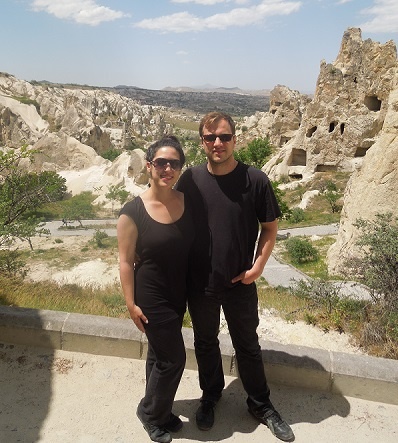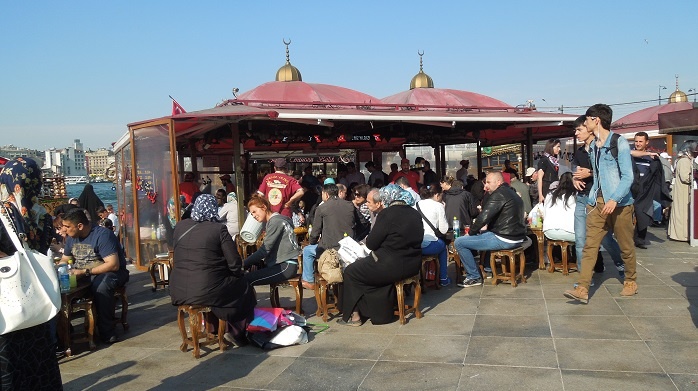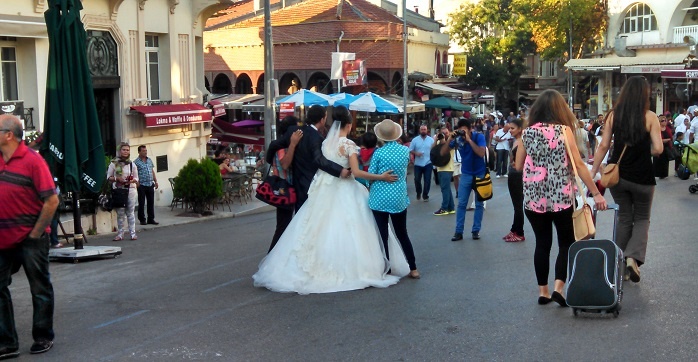Teaching English in Turkey: A Guide for Women
Written By: Pouneh Eftekhari | Updated: June 29, 2023
Written By: Pouneh Eftekhari
Updated: June 29, 2023

 For many, moving to a Muslim country brings about many questions and sometimes fears. Questions about women’s rights; personal safety & freedoms; food; and work conditions are just some of the concerns that come to mind. As a Midwestern American woman, born and raised in Wisconsin, I was excited at the thought of moving to a "secular" Middle Eastern country--Turkey--but I too also had some questions.
For many, moving to a Muslim country brings about many questions and sometimes fears. Questions about women’s rights; personal safety & freedoms; food; and work conditions are just some of the concerns that come to mind. As a Midwestern American woman, born and raised in Wisconsin, I was excited at the thought of moving to a "secular" Middle Eastern country--Turkey--but I too also had some questions.
How are women viewed in Turkey?
I taught English in Turkey in a wealthy suburb of Ankara where, as a female, I felt no different than I did in any European or American city. Shop owners made eye-contact with me; I wasn’t segregated to a certain part of the metro and I was treated as I had been in every European city I had ever visited. On the surface, in western cities in Turkey, all seems well.
The more I learned about Turkish people and culture, the more I began to see the subtle ways that men and women aren’t as equal as they appear on the surface.
While the hijab is not mandatory for women to wear, there are other ways in which women aren’t completely equal to their male counterparts. For example, in Turkey it is legal for an employer to ask women about their plans to have a baby and use that information when deciding whether to hire her or not. Likewise, traditional male-female gender roles are still dominant in society--even in the urban areas.
As a woman, will I be required to modify how I dress?
When speaking of dress, as with all things, it depends on where you are. Conservative cities, like Konya, will be full of women who wear the hijab, but in larger, western Turkish cities like Izmir, parts of Istanbul and Ankara, you will see very fashionable women who are dressed head to toe in H&M, Zara or Mango.  while I personally never wear short skirts and/or low-cut tops in the US, I will say that I didn’t notice many women showing cleavage. I have made similar observations in Europe where I think low-cut tops are not as common as we see in the USA. In Turkey, I didn’t notice many mini-skirts, but leggings could be found everywhere.
while I personally never wear short skirts and/or low-cut tops in the US, I will say that I didn’t notice many women showing cleavage. I have made similar observations in Europe where I think low-cut tops are not as common as we see in the USA. In Turkey, I didn’t notice many mini-skirts, but leggings could be found everywhere.
PRO TIP! Upon arrival to the city you plan to work and live in, take note of those around you and modify your dress accordingly. Again, unless your current style is somehow considered extreme, I wouldn’t anticipate having to make too many modifications if you live in larger, western-Turkish cities.
Is it safe for women to go out alone in Turkey?
When I moved to Turkey, I moved with my American husband, so I don’t have personal experience with dating or nightlife in Turkey as a single woman. Having said that, I have experience doing a variety of things alone or with other women--eating at a cafe, playing pool at a bar, walking from the metro station to my house, etc.--and felt just as safe as I would in any other large city. Applying common sense like being aware of your surroundings, not walking home drunk, etc. are definitely helpful in Turkey; especially if you are alone or with just a few women.

Should I have concerns about obtaining contraception or feminine products in Turkey?
My experience in the capital of Ankara -- a fairly liberal, western-Turkish city-- showed that it’s easy to find sanitary pads and tampons (a problem I faced nearly a decade ago in Western Europe); it’s possible to buy birth control without a prescription; and condoms are also easily found in grocery stores (even the religious ones that don’t sell alcohol).
I am not sure if and how things would be different if you lived in a more conservative city or part of the country, but I’d imagine that there would be access to such products.
NOTE: If this subject is important to you and you’re not sure what your potential future home might be like, ask your future employer or former/current teachers from that city.
Thriving in Turkey as a Western Woman - Some Key Tips
For me, living in Turkey was similar to my experiences living in France and Spain. It’s not the USA, but it’s not a war zone or somewhere to be feared. To set yourself up for success, keep these tips in mind before moving to and while living in Turkey:
1. Always carry a scarf with you. If you want to enter a mosque, you will need to use a scarf to cover your hair and any exposed skin.
2. Be aware that while women and men seem equal on the surface, women who are too friendly with men may be seen as flirting. This may send unintended and unwanted signals to men who may respond differently than an American man would.
3. Expect to encounter ‘old school’ ideas of gender roles. As a teacher, it was difficult at times to focus on correcting grammar versus the message. Sharing your ideas on gender roles and equality of the sexes can be appropriate in certain contexts, more often than not you will find yourself biting your tongue and just dealing with it.
4. If you don’t draw attention to yourself--in behavior and dress--you will likely not be bothered. Turkish people are extremely friendly and helpful. Similar to Spain and Italy, men may look or smile at you, but I never encountered anyone following me or shouting at me (like they did in France and Spain!).
5. Although Turkey is a predominantly Muslim country, the people I encountered in larger cities were peaceful and commonly secular and modern in their approach to life. Alcohol, cigarettes and even sex shops can also be found without much difficulty in the larger cities. So don’t let the label ‘Muslim country’ make you think you’re going back in time. It’s a very modern place.

6. Turkish people are incredible! They are not only hospitable and humble, but they are more generous than words can describe. I can’t count the number of times we received free food, drinks, gifts--even a whole cake!--simply because we were foreigners who, in Turkish, could say “we love Turkey”. They are extremely nationalistic and proud of their country and want to share the best of their country and culture with you, their guest.
Any women (or man) considering Turkey as a destination should absolutely take the chance and move there. It will be a life changing experience which will leave you wanting more.
Read more Pouneh's experiences teaching English in Turkey:
- Ankara, Turkey Q&A with Pouneh Eftekhari
- Teaching English in Turkey: A Journey Towards Career Freedom
- Is Teaching English Abroad Right for You?
Check out other perspectives of women teaching English in Turkey:
- Alumni Video: Teaching English in Istanbul, Turkey with Sarah Tomlinson
- Istanbul, Turkey Q&A with Valerie Davila
- Born In Istanbul: An Account of My Life After Teaching In Turkey - Ayn-Marie Hailicka
Pouneh Eftekhari
Pouneh Eftekhari, an American turned Europhile, has traveled to over 25 countries and lived in six (USA, France, Spain, Denmark, Turkey & Sweden). She is obsessed with food and travel and enjoys exploring new places near and far. Today, Pouneh and her husband live in Sweden where her husband studies and she runs her online business, Longing to Travel.
Want to Learn More About Teaching English Abroad & Online?
Request a free brochure or call 773-634-9900 to speak with an expert advisor about all aspects of TEFL certification and teaching English abroad or online, including the hiring process, salaries, visas, TEFL class options, job placement assistance and more.
"The Middle East is a very fascinating and unfortunately an extremely misunderstood area by so many. In a lot of ways, it’s an extremely easy place to adjust to, Western luxuries are quite accessible and almost everything is in English and Arabic."

- Katie Ayers
Teaches English in the UAE







